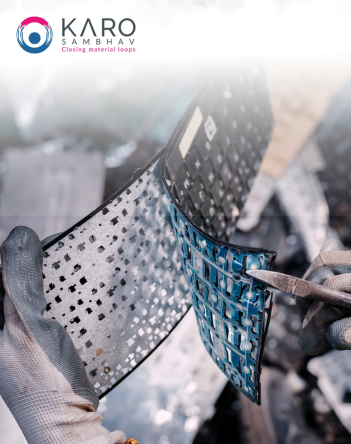Karo Sambhav collaborates with leading organisations to jointly develop industry frameworks, standards, governance mechanisms, systems and processes that advance the transition to circular economy. know more about our alliances.

This article was originally published on WEEE Forum
As a part of its strategic engagements with multilateral agencies, Karo Sambhav and Deutsche Gesellschaft für Internationale Zusammenarbeit (GIZ) GmbH are working together in the framework of the funding programme develoPPP, which the GIZ implements on behalf of the German Federal Ministry for Economic Cooperation and Development (BMZ). The Project titled ‘Developing Collection Infrastructure & Recycling Platform for Plastic Waste & E-Waste in Non-Urban India’ focuses on rural and semi-urban areas to develop legitimate and inclusive collection systems, while ensuring financial viability of such programmes.
Karo Sambhav, one of the first PROs to be recognised and registered in India for e-waste management, now works across multiple waste types. The PRO collaborates with value chain actors across all levels: right from ecosystem enablers to collection partners. It is also the first and only WEEE Forum member representing Asia. Karo has established a presence in each Indian state via on-ground teams and collection infrastructure. While formal collection systems have recently reached most metro cities, rural and semi-urban areas are often left out from channel development activities due to lack of scale and low scope for cost optimisation. This project marks Karo Sambhav’s foray into semi-urban regions of Goa, Ghaziabad and Varanasi that were otherwise not serviced by EPR-driven waste management systems. Key efforts are being made to experiment and map the true costs of developing collection channels and engaging directly with consumers in a diverse country like India, especially in remote and rural regions.
The three year project which will continue until October 2022 has ambitious objectives that target multiple stakeholders and activities at various levels of the value chain.
These objectives include:

The project has been able to reach over 1,000 people, generated 50 livelihoods and recycled/ processed over 500 tonnes of plastic and electronic waste. This was achieved despite the stringent lockdown measures due to the pandemic. While the project is still being implemented, there are some critical short-term outcomes that have been observed:
Innovation is required to reach consumers through unexplored channels. Karo Sambhav piloted programmes to study the waste flows and behaviour change outcomes from places like public distribution systems, mobile vans, pop-up waste collection drives and door-to-door pick-ups. The project highlights the need for innovation and investment in enabling the ecosystem that further allows EPR to function in the Indian context. Consistent experimentation, learning and piloting new programmes can positively affect not just PROs, but also add value to producers, governments, alliances and other decision makers.
Karo Sambhav collaborates with leading organisations to jointly develop industry frameworks, standards, governance mechanisms, systems and processes that advance the transition to circular economy. know more about our alliances.





